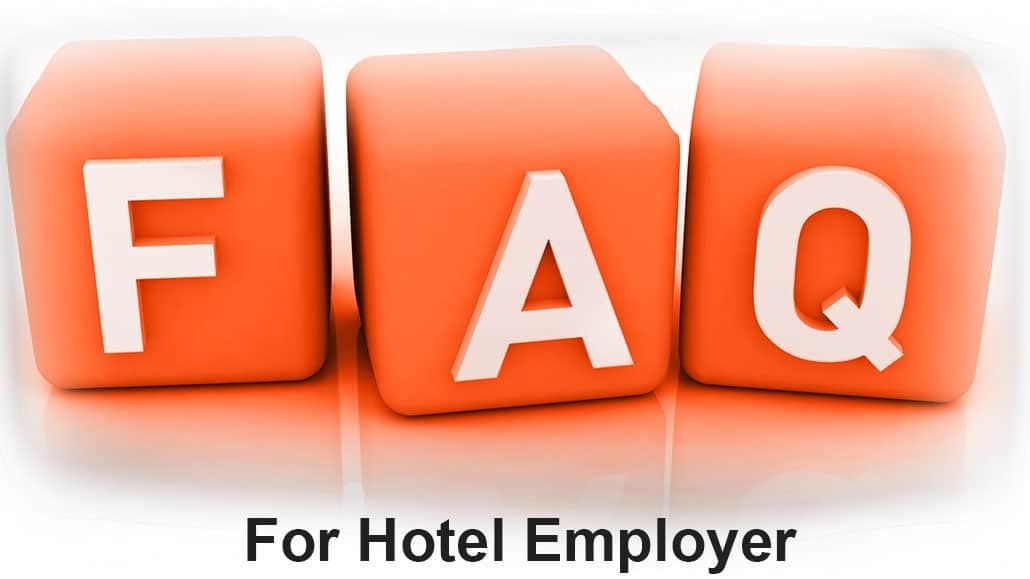Interviewing process purpose is to find the most suitable candidate. This means more than giving service with a smile, it’s understanding what guests want and exceeding their expectations. It means making a positive difference.
Interviews are a chance to get to know somebody a little better. How they communicate, how they react to situations they’ll encounter if they join, and how they could enhance your team. Use this guide along with the interview form and people profile for your hotel brand (where available) to help each candidate show whether they are the right fit for the brand and your hotel.

Interviewing process for hotel employer
Before Interview
- Agree the interview lead and other interviewers. Interviews are better when conducted by more than one person – its good to get someone elses viewpoint.
- Read the candidate’s CV/resume/covering letter.
- Review the job description (JD) and prepare technical skills questions and indicators.
- Take a look at the interview form and select the questions to ask.
- Download and print the job description (JD), interview form and people profile for your hotel brand.
During Interview
- Welcome candidates and spend 5 mins with introductions and
- explain what’s going to happen.
- Spend 30 mins on interview questions.
- Leave 10 mins at the end for candidates to ask any questions.
- Ask candidate to answer questions using an example to
- show what they personally did (follow the STAR model– Situation, Task, Actions, Result).
- Ask one question from each True Hospitality section and use the prompts. If needed, ask a second question.
After Interview
- Complete the ‘evaluation’ section of the interview form.
- Tell the successful candidate and file their CV/resume and interview form.
- Give unsuccessful candidates feedback within 7 days. File their CVs/resumes and interview forms.

Ensuring the interview is fair and objective
1. Allow candidates to talk
Make sure you allow enough time for each interview.
2. Stereotyping candidates
Don’t assume that members of a certain group have similar characteristics.
3. Rate accurately
Try not to be too generous, too harsh, or just rate ‘3’ to avoid making a decision.
4. Take a whole view
Don’t let one or two good or bad characteristics influence your evaluation.
5. Keep an open mind
Try not to draw conclusions early on. And don’t let your previous
experiences or knowledge of a candidate effect your judgement.
6. Use the indicators
Rate each candidate against the indicators rather than against the previous candidate.
7. Consistent listening
Try not to focus too much on candidates performance early or late in the interview.
8. Favourites
Try not to treat a candidate more favourably if they have a similar background to you.
9. Generalising rating
Rate each competency in turn rather than across the board.
10. Behaviour assumptions
Don’t assume candidates always behave as they do in an interview, as they might be nervous. But also try not to assume they normally perform better.
11. Use open questions
Let the candidate talk for most of the time and use open and probing questions to find out more and then clarify.
12. Take objective notes
Write down details of the examples candidates share. Do not include notes on your own judgments – keep it objective.
Evaluation process guidelines
- Make sure you take everyone’s opinions into account and reach an objective decision.
- Compare your notes to the service behaviour indicators.
- As a group, discuss the candidate’s interview and allocate a score for each area using the scoring guideline on the interview form.
- Add the final scores to one summary sheet. Each candidate’s summary sheet and overall sheet should be submitted to HR.

Frequently asked questions
1. Which roles are the interview forms for?
The frontline interview form is for frontline roles only.
2. Are the interview forms only for external candidates?
No. Use the same forms for internal and external candidates to keep things consistent and fair.
3. Should I look at internal candidates’ background information?
It’s a good idea. You’ll learn more about their skills, qualifications, education, employment history and experience.
4. Who should be involved in the interview?
Involve any relevant team members. When your team has a say in who gets the job, they’re more likely to help that person succeed.
5. What’s the best way to take notes?
Listening and taking notes at the same time isn’t easy. Try to jot down key points as the candidate is talking, and then add to them immediately after the interview.
6. How can I choose the right questions?
Use the interview form to decide which questions you’ll ask all the candidates.
7. Can I ask questions that aren’t on the form?
There’s a section on the interview form where you can add technical questions for certain roles. You can also ask specific questions about the hotel or role, but remember to keep to any national or local employment laws.
8. How can I get more useful answers?
Help the conversation along with open questions like “How do you approach customer complaints?” Rather than “Do you handle complaints well”? Avoid hypothetical or situational scenarios and leading or closed questions.
9. What type of experience should I focus on?
Try to get a balance. But if they talk more about team efforts than personal efforts, ask what role they played in the team.
10. How can I get the most from behavioural questions?
Behavioural or situational questions give a good idea of what someone is like to work with. So say things like “Tell me about a time you…” Base any behavioural questions on their experience, then ask follow-up questions to give you a clearer idea of their approach and suitability.
11. How do I score candidates?
Listen to them, take notes and rate their answers against the indicators on the interview form. Then use the rating section at the bottom of the page to give them a score.
12. What should I do with the interview form after the interview?
Make sure your notes are clear and you’ve filled out the whole form. Then attach it to the candidate’s CV/resume and cover letter and store it with their application in a secure folder. Follow your hotel’s admin guide when it comes to offering or declining the role.
13. How do I choose the right candidate?
Use the scoring criteria to make an objective decision based on the skills, experience and interview performance of each candidate.
14. Should I respond to every applicant?
Absolutely. It’s the professional thing to do and helps cement our reputation as a friendly, courteous brand.


 Tiếng Việt
Tiếng Việt